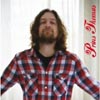 Prins Thomas's solo debut full length is a long, evolving, synthesized dream shuffle through some heady landscapes. His expertise makes sense of the fluid mind-body connection in the music of dance, psychedelia and German electronica.
Prins Thomas's solo debut full length is a long, evolving, synthesized dream shuffle through some heady landscapes. His expertise makes sense of the fluid mind-body connection in the music of dance, psychedelia and German electronica.
 
I can't pretend to be up on all the roots of this album, so those who want a map leading from the influential dance music producers in Detroit, or NYC, across the UK, through the myriad side-alleys of so-called rave or house culture, and all the other sub-genres, to this Norwegian craftsman have come to the wrong place. Prins Thomas creates great clarity from disparate sources and manages to let some of the reference points in his music remain elusive. He layers and mixes sounds in a way that is far from obvious. Part of the fun is in allowing the mind to wander beyond the obvious beats to a place where his little nods to, say, surf guitar, Tamla Motown, 1960s French pop, space rock, or film music, may reveal themselves.
If this music does indeed belong on a dance floor, then it is one which resembles one of those moving walkways at airports, except that this walkway extends for miles, into and out of darkness and through a terrain that is always evolving. I stress the headphones and trippy qualities of this album rather than the party-starting capabilities, because these sounds mostly take my mind anywhere but to a dance floor. Instead, they pick me up and dump me down wells, at sex change operations, on the autobahn doing 140 mph, and at dull suburban barbeques. Most of all they put me back on the night shift at a cookie factory making robotic movements near a conveyor belt but with my mind travelling anywhere else: along wet leafy paths, into lovely dark pubs, up huge sand dunes, out into a crisp bright winter day, into someone's arms, on ferries, up some ancient stone steps, away from it all.
The album begins strongly with "Orkenvandring" appearing to lead to a weirdly fluid world where The Archies have fused guitar tones from Roxy Music's "Avalon" onto the "Sugar Sugar" beat and invited Neu! around to speed things up. The good thing is that Prins Thomas doesn't repeat that exact same trick. For contrast, he often includes a minute of fade out or a few seconds of compressed sound at the end of these long tracks. This acts as a palate cleanser for the next piece. Thus, the handclap rhythms on "Uggebugg" stand out, snap the potentially catatonic state, and prepare us for transportation to an eight minute tribal gathering where bush-bound African ghosts beat on wood as they watch surfers glide across waves, clouds and off into space – or something like that.
"Slangemusikk" (or "snake music") weaves tapping and slippery synth rhythms to conjure how I imagine falling down a bottomless well might feel: at first dark and disconcerting but giving way to a feeling of almost slowing down as eyes adjust and observe impossible carvings or gummy footed creatures on the passing bricks. "Sauerkraut" starts out over-repetitive and flat. Doubtless that gut feeling or subliminal neck-jerk came from some bad experiences with the actual vinegary mush swilling around inside, because the track very quickly evolves into a satisfying dish of multi- rhythmic sumptuousness, seasoned with some lovely splashes of guitar, trumpet and clavinet. Like several of the songs it maintains a constant pace yet also seems to alter speed, getting faster in a lovely way reminiscent of the drumming at the end of Scott Walker's "Such A Small Love."
The first three minutes or so of "Wendy Not Walter" are a bit of a dull throb best forgotten: the musical equivalent of a discussion about golf or hunting with a group of loud men in ill-advised shorts at a mind numbing social gathering. The track is obviously a nod to the gender alteration of W. Carlos and, sure enough, several minutes of twinkling synths follow and bring about a satisfying change. The pace picks up and new elements are revealed; a rescue of sorts from the trapped-with-bores-at-the-barbeque feeling.
After five tracks (and more than 40 minutes) of all this rolling around in psychedelic shimmering shape shifting beats, "Nanosket" has a welcome heavier beat and also (discounting some indistinct moans in an earlier track) a warm, human voice humming along. After three minutes or so, the piece begins a slow dissolve into a brief fading dream of pedal steel guitar. This bleeds into the twinkling guitar and gently gurgling intro of "Attiatte" which has such a clear resemblance to Kraftwerk's "Neon Lights" that a nostalgic teary feeling bubbled up inside me. The audio clip (included) cannot do justice to the wallop that this piece eventually packs.
If Prins Thomas's music lacks anything it is perhaps a sense of sex. No offense to any emerging class of artificial intelligence but while these rhythms do have a robotic grace and are adorned in some alluring mystery, something raw and beautifully flawed may be missing. Of course, at times humans appear to behave like machines and sometimes want music to match. The mirror image of this is that the robotic sounds can seem more human all the time. But even if that image looks great, you probably wouldn't want to sleep with it.
samples:
Read More

